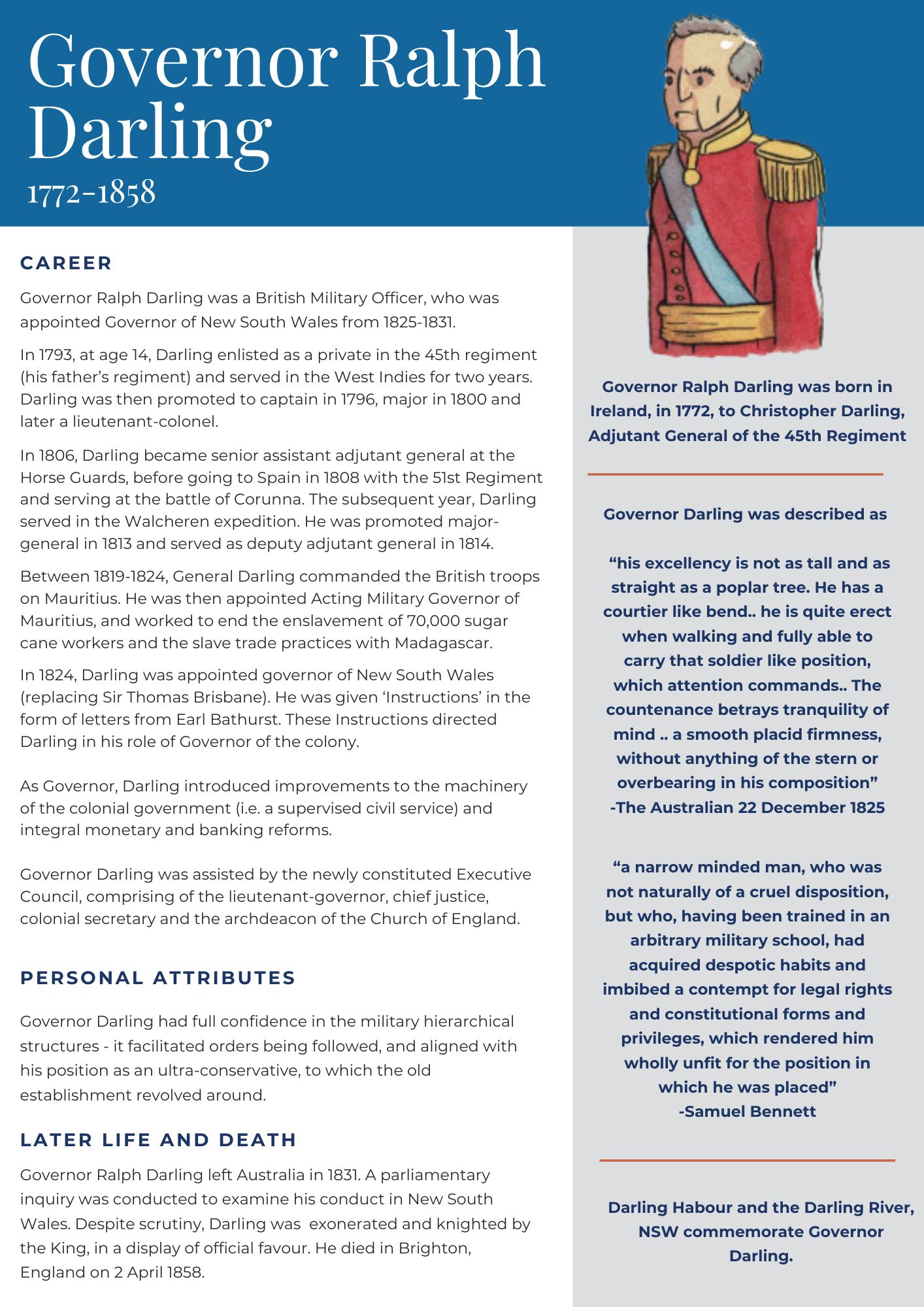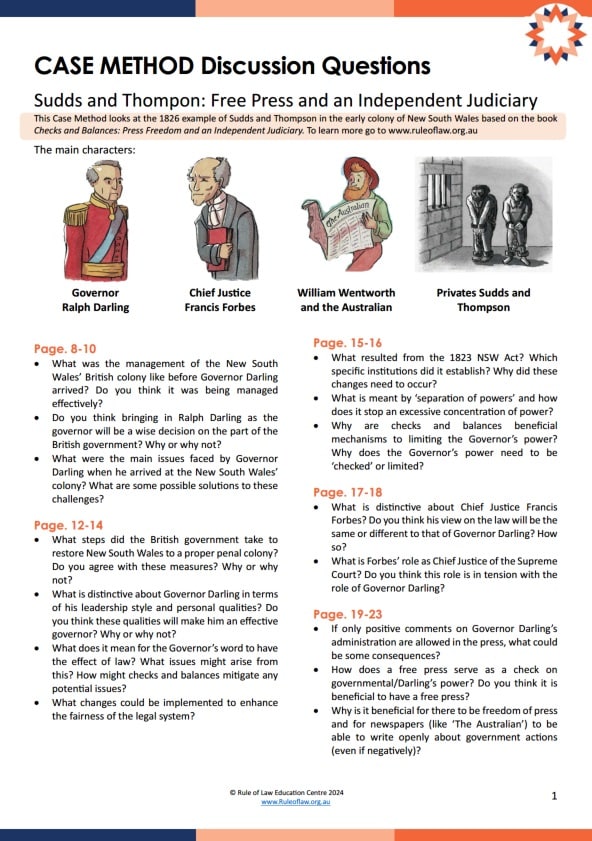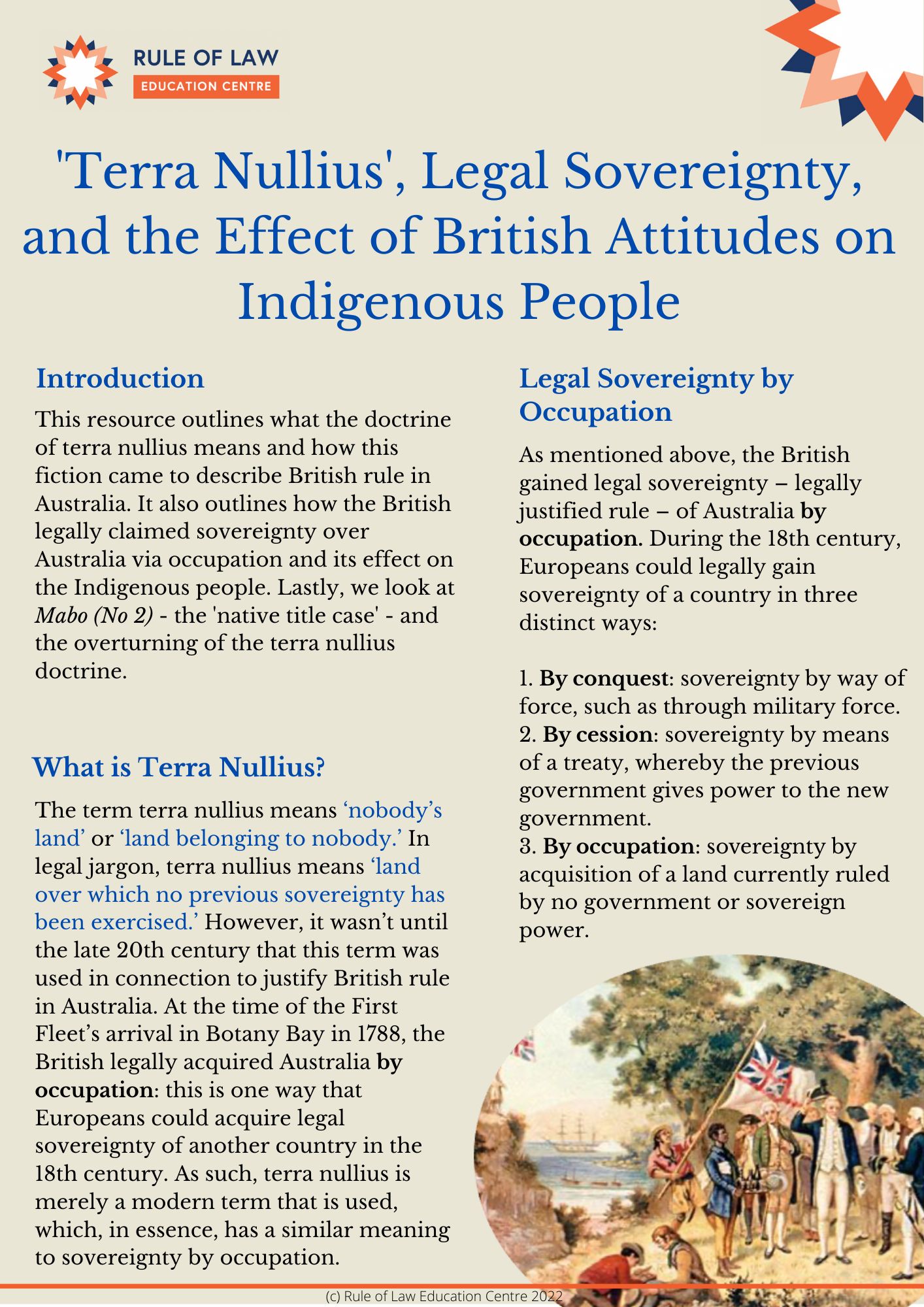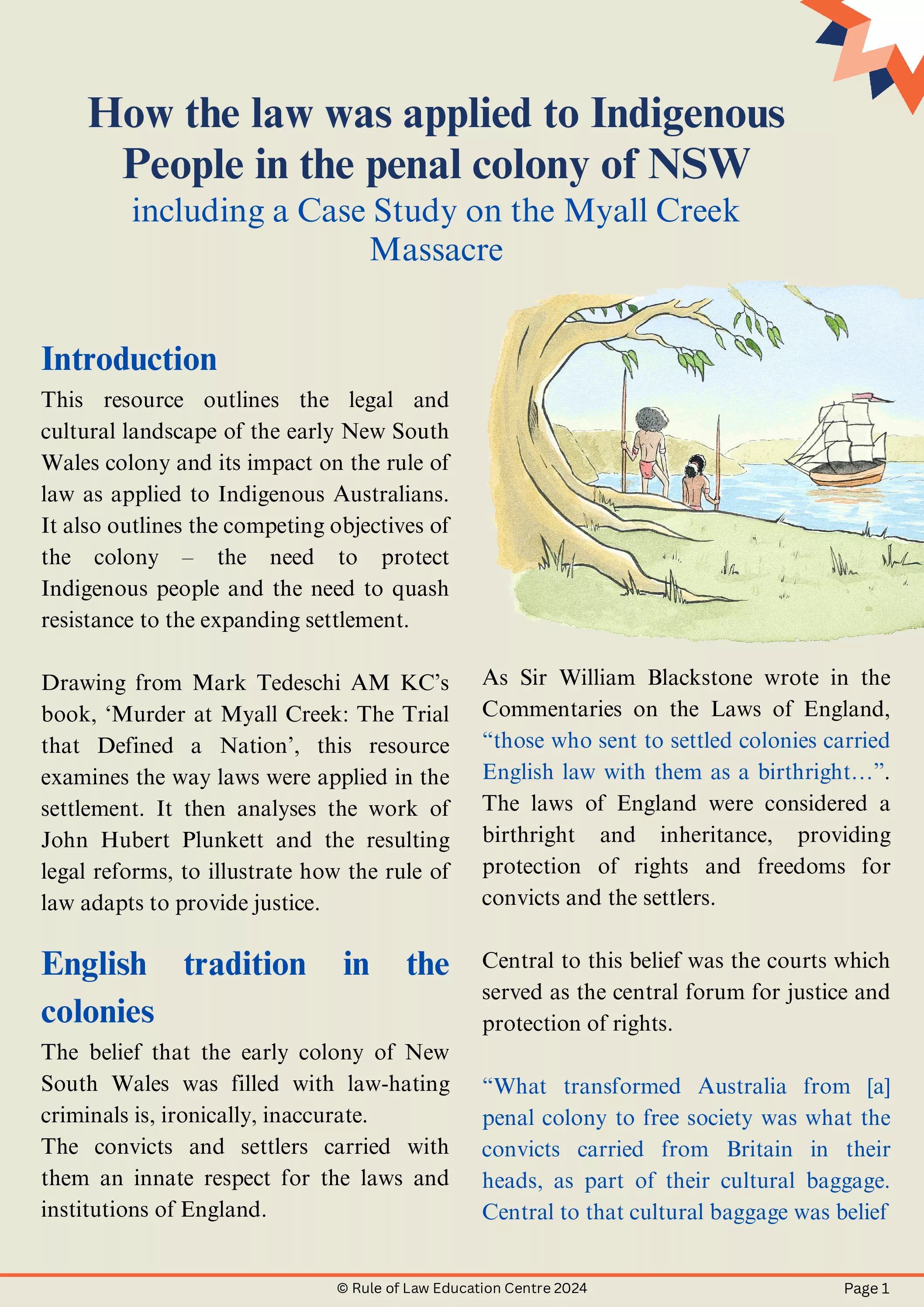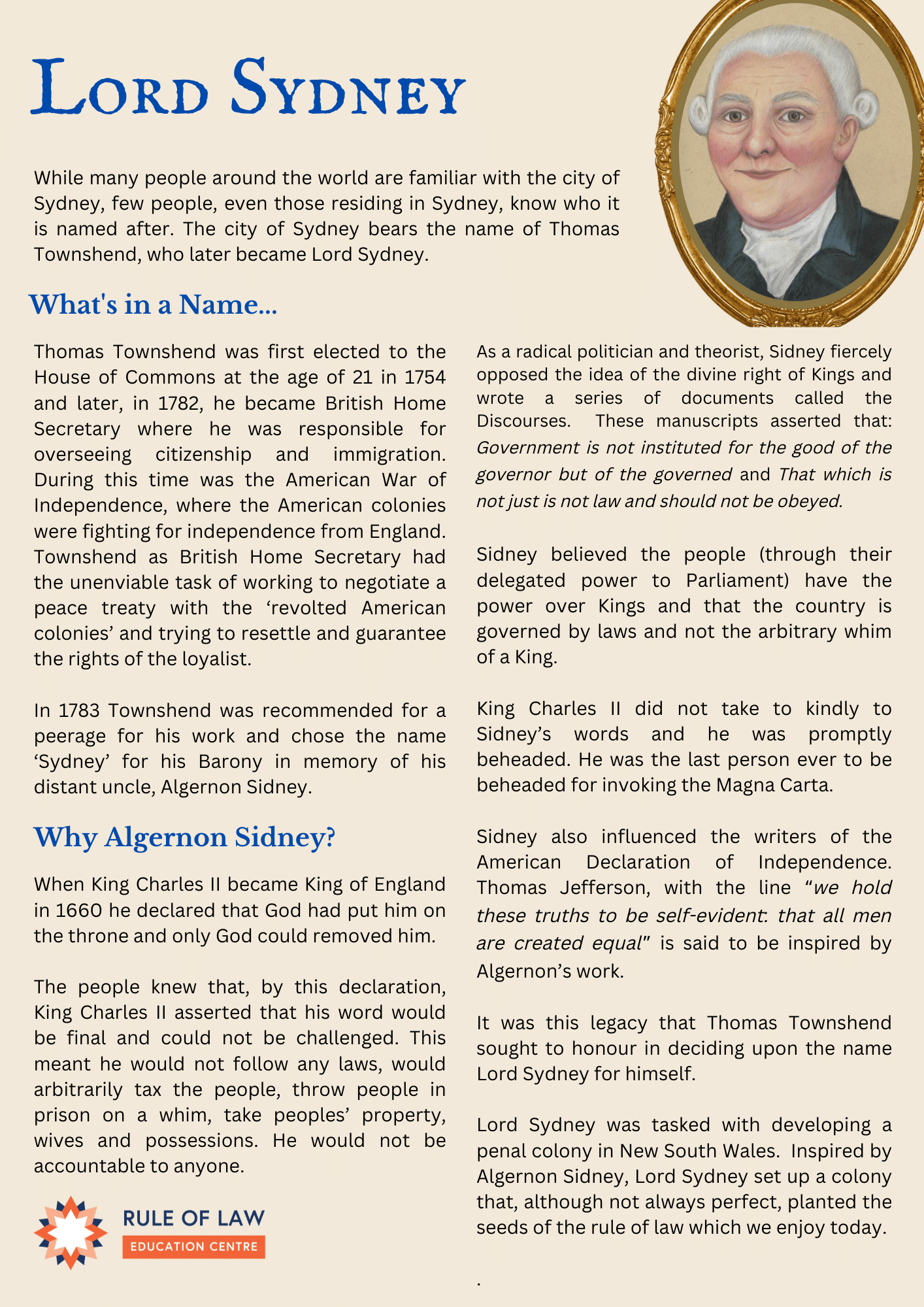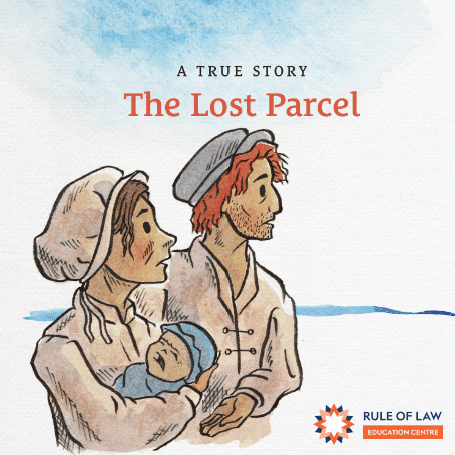The Establishment of the NSW Supreme Court
A Free Press and an Independent Judiciary
From the earliest of days of the NSW Penal Colony, the values and institutions that underpin Australia’s democratic form of government were present. The concept of the separation of powers, with an independent judiciary and freedom of speech (through the free press), were important elements that protected the rights of citizens (both convicts and free) and contributed to a fair society.
These ideals have not been static nor perfectly realised. They have required re-evaluation and reform by brave Australians who have stood up when the protections were not available to all in society.
The story of Checks and Balances: Press Freedom and an Independent Judiciary is about one such person, Chief Justice Forbes.
Case Method: Francis Forbes and the Establishment of the NSW Supreme Court
Checks and Balances of a Free Press and Independent Judiciary
“If you were Chief Justice Forbes in the early colony of NSW that was filled with convicts, would you allow a free press?”
The below resources help teachers use the Case Method to look at a historical dilemmas from the past to develop an understanding of current civic concepts. For more details about the Case Method, click here. These resources, all have printable PDF’s and include:
-
- Case Summary: The Story lets history unfold in the present
- Case Exhibits: Primary Source documents that provide students with an insight into the information available to decision-makers at the time and are read prior to class
- Exhibit 1: Source Documents on Governor Ralph Darling and Chief Justice Forbes
- Exhibit 2: Source Documents on Freedom of the Press
- Exhibit 3: Source Documents on the Sudds and Thompson incident
- Discussion questions: That the teacher can use to prompt class discussion
- The Outcome
The Story of Chief Justice Forbes and his battle for the Free Press: Story Book
‘Checks and Balances’ tells the story of the explosive tension between Governor Ralph Darling, who has been sent to the colony to rebuild it as a place of terror for convicts and Chief Justice Forbes, whose duty it was to administer justice through the courts and ensure that the rule of law was upheld by all… even the Governor! With such great power being vested in two men with such opposing objectives, who will win out – the unyielding military man, Ralph Darling or the morally upright, Chief Justice Forbes? This book illuminates the importance of having checks and balances in place (such as an independent judiciary and free press) to restrain the tyrannical ambitions of the Governor and to ensure that the rule of law is universally upheld.
Click here to purchase our storybook.
Teacher Documents
The Story: Case Summary 
- In 1788, the First Fleet arrived in Australia. The British government established New South Wales as a penal colony for sentenced criminals, intending it to be a place of punishment and reformation, and for transportation to evoke real terror.
- However, by the time that Ralph Darling arrived in New South Wales in December of 1825, the situation was vastly different. Instead of NSW being a terrifying place that convicts feared going to, the colony was being run as an open and free society – where it was difficult to determine who was a convict, and who was free.
- Realising this, the British government decided that things needed to change and sent in military man, Ralph Darling, to rectify the situation. Governor Darling was instructed by Earl Bathurst to “get tough on convicts” and “pull the colony into shape.” In sum, he was tasked with turning NSW into the proper penal colony it was always intended to be.
- Darling was a professional soldier, from a military background who was used to people obeying his orders and adhering to strict hierarchies. He transferred this military mindset to the way he governed the colony – expecting the convicts to submit to his authority and to obey his every word.
- But Governor Darling wielded excessive power with inadequate ‘checks’ in place to regulate him. In fact, in the early days of the New South Wales colony, the Governor’s word often had the effect of law. The only official ‘check’ on his power was the British government – yet they were ineffective, as due to their distant location, it took more than a year to get a reply by mail. So, Darling could basically govern as he pleased.
- The 1823 NSW Act (passed by the British parliament just prior to Darling’s arrival), however, had started to change things. It not only created important new institutions like the Legislative assembly, Executive Council and the Supreme Court, but also provided a much-needed ‘check’ on Darling’s power as Darling was forced to consult with these institutions, rather than creating laws as he saw fit.
- At the head of this newly established Supreme Court was Francis Forbes – the first Chief Justice of the Supreme Court of NSW. Forbes had an extensive knowledge of the law and was determined to uphold the 1823 NSW Act, even when he encountered pressures from Governor Darling to disregard the law. As Chief Justice, his role was to keep the Governor’s power in ‘check’ and to protect the freedoms of those in the NSW colony. He acts independently of Governor Darling and must resist infringements on these freedoms, and overall, must remain impartial.
- In 1826, two soldiers – Joseph Sudds and Patrick Thompson – decide that life would be more enjoyable if they get discharged from the army and become convicts. So, the pair steal some fabrics from a Sydney shopkeeper, intending to be caught.
- Their desire to become convicts enraged Governor Darling, as it exposed that he was failing to convert the colony into a place of salutary terror.
- So, Governor Darling decides to make an example of the pair – and steps in to worsen the sentence, commuting it to a flogging and assigning them to seven years of hard labour in the chain gain. Darling however was unaware that Sudds was already seriously ill, and he dies of fever a few days later in hospital.
- Darling’s treatment of Sudds and Thompson horrifies the Australian newspapers who wage a public campaign against Governor Darling – labelling him a tyrant and criticising him for inflicting such cruel and vicious punishments. Governor Darling is not used to his authority being questioned or in ‘check’ and strongly dislikes when newspapers like ‘The Australian’ criticise him. So, Darling wants to restrain the press’ freedom in publishing negative comments.
- As such, Darling wants to introduce a press licensing law that would force people to apply directly to the Governor. This would allow him to control the newspapers and to cancel licenses if defamatory material about him or his administration was published.
- But Forbes does not agree with Darling’s perspective that an annual license should be introduced and argues that the freedom of the press is a constitutional privilege which cannot be denied.
- Nonetheless, in April 1827, Governor Darling submits two draft bills to the Executive council. The first aimed to regulate newspaper publishers and to restrict their ability to publish negative content about him by implementing a licensing system. The second bill sought to impose a newspaper stamp duty.
- Forbes argues against Darling’s attempt to impose the license system, claiming that:
- The measure is repugnant to the law
- The colony is not in immediate danger – despite the claims of Darling that it is
- The annual license would destroy the freedom of the press and place it at the discretion of the government

Students should read Exhibit 1 (Sources A and B) prior to Lesson One.
Exhibit 1 – Governor Ralph Darling & Chief Justice Francis Forbes
Source A
Extract from Australian Discovery & Colonisation (Volume II – 1800 to 1831) by Samuel Bennett, 1865.
“The gentlemen appointed to succeed Sir Thomas Brisbane as governor of New South Wales, was Lieutenant-General Ralph Darling, a clever but narrow-minded officer who had been long employed at the Horse Guards, and who was so thoroughly imbued with the spirit of military routine that he was a most unsuitable person to preside over a civil administration….
His character had preceded him. It has become known in the colony that he was a mere official formalist, a man of system and routine, a strict and severe disciplinarian, who had obtained his rank in the army and had been selected for his post as Governor rather for his acquaintance with the details of office, and his ability with the pen, than for his achievements with the sword…There are few amongst the populace look with much favour upon mere office men, scholars, or clerics, who may happen to occupy positions of command. These facts and considerations fully account for the coolness and suspicious with which the new Government was regarded….
Darling was one of those men who never do things by halves, and the system he introduced went to the opposite extreme. Under its operation, order and regularity were introduced, it is true, but the complicated systems of checks and counterchecks, and the multiplication of requisitions and forms, was carried to such an excess as to become a nuisance of a very formidable character, and to cause the remedy to be almost as bad as the disease. It frequently happened, under these elaborate and minute red-tape regulations, that the loss of time and the clerical labour required to carry out the necessary forms and checks attendant upon a requisition for a trifling article or service needed by the Government were ten times more than the value of the thing itself…
It is almost impossible now to give an idea of the absurd extent to which this system of complicated checks and regulations was carried. Yet it not so much owing to this, as to what his friends called his anti-convict policy, that Sir Ralph Darling grew more unpopular every day with one party while by the other he was looked upon as the kindest of patrons and the most generous of men. His antagonistic position in reference to a large class of the population, and the dislike in which he was generally held by the great majority of the colonists, drove him to regard those who composed the narrator circle of the exclusives with peculiar favour. To compensate for the dislike of the many he endeavoured to secure the personal regards of the few, and he did not hesitate to reward their attachment by lucrative appointments, lavish grants of land, and all the other coveted favours that a governor had the power to bestow. The partiality thus indulged in served to exasperate the feelings of the majority the more, because many of the fortunate recipients were unworthy in character and low in public esteem.”
Source Analysis Questions
- Account for the perspective of Source A.
- What are the values and limitations of Source A for a historian studying the administration and policies of Governor Darling in New South Wales?
- Outline the reasons for Governor Darling’s unpopularity.
- How useful is Source A for understanding public opinion on Governor Darling’s governance style?
- To what extent was Governor Darling an effective governor of New South Wales? Integrate evidence from Source A in your answer.
Source B
Extract from Sir Francis Forbes: The First Chief Justice of the Supreme Court of New South Wales by C. H. Currey, 1968.
“When at length, after Bigge’s Report on the Judicial Establishments of the Colony, it was realised how imperatively the Colony needed a constitution and a judicial establishment, it was to Francis Forbes that the task was committed of guiding the still largely primitive society of New South Wales towards the principles of the Rule of Law which had for so long been treated with scant regard if not trampled underfoot. And, oddly enough, he was to do this whilst occupying a dual role as a member of the Legislative Council as well as being Chief Justice of the Supreme Court, an office which carried the additional responsibility of certifying to the validity of Colonial laws.
In the hands of a man of less integrity, courage and legal ability, these multiple powers could have become instruments of oppression and caprice, but with the guiding principles of the common law always in full view and a clear appreciation of the relation of Crown and citizen and of the proper function of the courts, [Chief Justice] Forbes was able to infuse a measure of constitutionalism and legality into the government and daily administration of the affairs of the Colony. This task was accomplished…[even] in the face of substantial opposition by influential segments of colonial society and often with little or no sympathy from a wider public, but it was pursued with objective zeal, courage and humanity.”
Source Analysis Questions
- Account for the different perspectives of Governor Ralph Darling and Chief Justice Forbes shown in Sources A and B.
- What are the values and limitations of the perspective provided in Source B?
- What does Source B reveal about the roles and responsibilities of a Chief Justice?
- What are the values and limitations of Source A for a historian studying Francis Forbes’ contributions to establishing constitutionalism and legality in New South Wales?
- To what extent were Francis Forbes’ personal qualities well-suited to his role as Chief Justice? Was Forbes effective at upholding the principles of common law? Integrate evidence from Source B in your answer.
Students should read Exhibit 2 (Sources C and D) prior to Lesson Two.
Exhibit 2 – Freedom of the Press
Source C
Extract from the opening editorial of The Australian (Sydney, NSW: 1824 – 1848), Thursday 14 October 1824, page 2. Accessible at: http://nla.gov.au/nla.news-article37074013
“In a Colony whose energies are thus expanding, little doubt can be entertained of the utility and efficacy of an Independent Newspaper. The aggrandisement and the increasing wealth of a people introduce a complexity in their affairs; conflicting opinions and conflicting interests arise, individual influence is apt to luxuriate and flourish where there exists no corrective to check its exuberance or prevent its growth. A free Press is the most legitimate, and at the same time, the most powerful weapon that can be employed to annihilate such influence, frustrate the designs of tyranny, and restrain the arm of oppression. Without its active and liberal co-operation the biased views of a party frequently preponderate, while the true interests of the public languish and are over-looked. In offering THE AUSTRALIAN to our Readers we pretend to no uncommon merit, we affect no singularity, we anticipate no triumphs. Aiming at something more than rendering it a mere miscellany of news or compilation of events, we are solicitous that it should become the medium of extensive and general communication among all the members of the Colony, thereby concentrating public opinion and giving a tone and a direction to public feeling. Whatever questions may arise involving the interests of the whole or any portion of the Colonists, whatever state measures may be promulgated they will each receive from us an attention and deliberation commensurate with their importance, at the same time that we afford every facility to an interchange of opinions among those who choose to become our Correspondents, as well as Readers. In the many topics that may come within the scope of our comments, we do not limit ourselves to any precise line of politics. Independent yet consistent — free yet not licentious — equally un-moved by favour and by fear — we shall pursue our labours without either a sycophantic approval of or a systematic opposition to acts of authority merely because they emanate from government.
… We are also endeavouring to organise a system by which we shall be enabled to give an account of all domestic occurrences of immediate interest…We must endeavour to amuse readers of all classes, and all tastes, and while we attend to objects of the first magnitude and importance, we shall be careful not to overlook those of minor consequence. Aware of the necessity that exists for the exercise of every diligence to avoid giving circulation to erroneous reports, we shall on no occasion insert any article of news that is not fully authenticated. And though we reserve to ourselves the utmost latitude in the expression of our opinions, we shall studiously abstain from individual attacks and personal invective, which can only be indulged in for the purpose of gratifying a malignant mind, or a rancorous spirit of revenge. It is the errors of a system — the vices of office that we condemn. It is measures not men that we assail; and our respect for the one will not restrain our animadversions on the other. A legal responsibility, we know, will attach to us for every thing we may publish in the AUSTRALIAN — but we consider ourselves responsible in point of principles for such opinions only as appear in the leading articles, and our consistency cannot be impeached for admitting into our columns the letters of Correspondents, though they may militate with our own avowed sentiments. Indeed it would be in direct contravention of the spirit of a free Journal to exclude the writings of all whose views of a question happened not to coincide with our own. A Newspaper carried on in undeviating conformity to these rules, must naturally meet with universal approbation, and eventually give rise to most important results to the Colony.”
Source Analysis Questions
- What are the values and limitations of the perspective presented in Source C?
- Account for the perspective of Source C.
- What is the purpose (and agenda) of Source C?
- Explain the goals and objectives of The Australian newspaper in shaping public opinion and discourse in the colony. Integrate evidence from Source C to support your response.
- Who is the the intended audience of Source C?
- Evaluate the usefulness of Source C to a historian studying the necessity and impact of a free press in the colony.
- To what extent is the freedom of the press significant? Support your response using evidence from Source C and other relevant sources.
Source D
Extract from Sir Francis Forbes: The First Chief Justice of the Supreme Court of New South Wales by C. H. Currey, 1968.
“Two Bills, one to regulate newspapers and the other to impose stamp duties…were transmitted by His Excellency to the Chief Justice on 11th April with a cover note stating that he proposed to bring them under the consideration of the Legislative Council.
… Since Darling had already inferred that Forbes would not certify a measure instituting the licensing of newspapers, the assumption in his note does not permit of a ready explanation. “His Excellency seems to have thought,” observed Forbes, “that it was of course for me to certify the proposed law and for the legislature to adopt.”
“To the adoption of so much of the Statute Law of England, as facilitates the proof of publication in cases of libel and inflicts additional penalties on conviction of blasphemous and seditious publication,” he replied on 12th April, “there can be no objection; and I shall be ready to certify such parts of the Bill immediately.” So much of the Bill, however, as related to a license for newspapers resumable at the pleasure of the Executive Council, he declined to certify….His reasons for so suggesting were, first, that he was anxious to avoid being obliged to declare that a measure, “recommended by so high an Authority as the Secretary of State”, was repugnant to law, and, second, he was “equally solicitous to learn what might be the opinion of His Majesty’s Law Officers upon a question much too large and momentous to place upon the undivided responsibility of so humble a functionary in the administration of the laws of an empire as himself. Assuming that his suggestion had been adopted, he now invited His Excellency to consider whether it would not be wise to refrain from pressing, the, to him, uncertifiable part of the Arthur Bill until the further pleasure of His Majesty’s Government was known.
Darling, however, was adamant.
Had not the papers preserved in their mischievous endeavours to bring the Government in hatred and contempt, and in fact succeeded in exciting a strong spirit of discontent among the prisoners [he replied to Forbes, on 14th April], I should not have thought it necessary to agitate the question at the present moment….Considering, as I do on the most mature reflection, that the safety of the Colony is endangered from the present licentiousness of the press…it would be inconsistent with my duty to wait the result of the reference…The order…is imperative on me; and, concurring as I do in the expediency of the measure which it directs, I cannot longer abstain from using my best endeavours to carry it into effect. It is my duty…It therefore only remains for me again to transmit to you the enclosed Bills…
Thereupon the Chief Justice promptly returned the two Bills. To the one that was to regulate the newspapers, he denied his certificate in respect of its first six clauses, since they regulated the matter of the license. The other, which dealt with the imposition of stamp duties, he certified in the form in which it was presented to him. In that form, the amount of the duty was not stated; his certificate, therefore, went only to the principle of the Bill. When the amount of the stamp duty was determined the Bill would, in his opinion, again have to be certified by him.
This correspondence between the Governor and the Judge divided them sharply. Forbes thought the General was mistaken about the discontent amongst the convicts. “Prisoners, I am assured by the Superintendent,” he wrote, “are as quiet and well-disposed as they have been for years past; and neither within the range of my experience in the criminal court, nor in the executive council, has it appeared that any sensation has been caused by the papers among the prisoners of the Crown.”
… “The course” in question had been determined by Darling himself, and had been consistently followed by him, for the reasons he gave, until, infuriated by his newspaper critics, he decided to have an instrument made that would put them under his thumb.”
Source Analysis Questions
- Outline the reasons provided by Chief Justice Forbes for his refusal to certify certain clauses of the newspaper regulation bill.
- Assess the value and limitations of Source D for understanding Governor Darling’s motives regarding the regulation of newspapers.
- Assess the value of Sources D for a historian examining Governor Darling and Chief Justice Forbes’ perspectives on freedom of the press.
- To what extent does Chief Justice Forbes’ response to Governor Darling’s proposals demonstrate his commitment to upholding legal principles and preserving the independence of the judiciary in the colony?
Students should read Exhibit 3 (Sources E and F) prior to Lesson Three.
Exhibit 3 – Sudds and Thompson
Source E
The Australian (Sydney, NSW: 1824 – 1848), Tuesday 27 January, 1829, page 2. Accessible at: http://nla.gov.au/nla.news-article36864189
“We consider the enquiry of the Council as unconstitutional… We do not conceive that the report says anything, but we hate all deviations from what is legal and constitutional. — Justice, however, is above Governors and Judges: let each man make his own defence; we are no man’s apologist, and we say, in God’s name, let justice be done. To proceed—a charge is made against the Governor for doing an act from which death ensued. To defend himself, his Excellency convenes the Council to enquire into, and give their opinion, not of the legality of the act, nor of its expediency, but merely of the circumstances of Sudds’ death. The Council consisted of the Governor (the defendant) Colonel Stewart, the Chief Justice, Mr. McLeay, (the Archdeacon was absent) and Colonel Dumaresq, the defendant’s brother-in-law, sat as clerk to take down the evidence. The witnesses called were, Martin Wilson, un-der gaoler, John Toole, first turnkey, John Thomp-son, medical attendant, Mr. McIntyre, Assistant Surgeon on the Civil Staff, Dr. Bowman, Principal Surgeon, Captain Dumaresq, defendant’s brother-in-law, and Mr. McLeay, his staunch supporter. It will be seen that there was not a person present who was not an officer of Government, and not a witness examined, that was not liable to be displaced from his situation. Far be it from us to say or to insinuate that the proceedings were not conducted with as much propriety as if the whole world had been present—yet we do say that it would have been far more delicate and satisfactory to have examined witnesses, who must have been above the influence of intimidation or of favour, and beyond the reach of suspicion ;—thus the Sheriff, Dr. Mitchell, and persons present on the parade, should have been called, and an open inquiry would have removed that suspicion which almost always attaches to mystery. But least of all should the Governor have been present, or his brother-in-law have recorded the proceedings. Let it not be tortured into a libellous imputation, when we say that there was an indelicacy about this, which ought by all means to have been avoided…We have shown that the Enquiry before the Council was UNCONSTITUTIONAL—that it does not save the Governor from responsibility—that it was an indelicate procedure— that the defendant sat as President, and his brother-in-law recorded the proceedings—and that the result does not appear to have been unanimous—but that at all events it was a result which comes to nothing, or at least only to this: that Sudds had unusual chains on, and did die within six days of his increased punishment. We cannot dismiss this subject however, with-out asking why was not a CORONER’S INQUEST summoned upon the body of ill-fated Sudds? This would have been a constitutional and a satisfactory tribunal to have investigated the causes of his death. Had he died in gaol, this must have been done—why was it not done, when he was removed from thence but the day before? Sudds’ death was known by the Government on the very day it occurred. We have never heard, we have never been able to conceive any good reason to justify a deviation from the constitutional enquiry before a coroner and jury.
… They [the House of Commons] will decide whether will is to be substituted for law—and whether or not an iron collar be a fitting decoration for the neck of an Englishman— of even an English culprit. They must determine whether he, who is sent here to govern according to law, and who daily administers punishment for the neglect or infraction of the laws, have authority himself to step without the pale of them. It is for the Legislature to determine if high functions are to shield the bearer from accountability; and if that person be a fit delegate to administer justice, and govern according to law, who by his own example could encourage a disregard and ignorance of its plainest principle? To the House of Commons we leave the case, fully expecting justice; and though we shall ever show that becoming respect which is due to the individual who holds his Majesty’s Commission to govern this Colony, we can never believe and affirm that the author and ostensible executor of Sudds’ punishment, and which terminated in his death, is a fit person to rule over a British Colony.”
Source Analysis Questions
-
Assess the value of Source E for understanding public perceptions and reactions to the punishment and treatment of soldiers Sudds and Thompson.
-
Outline the reasons given as to why the enquiry of the Council was unconstitutional.
-
Describe the perspective of Source E.
-
Assess the value of Source E for understanding the role of the press in shaping public opinion and discourse regarding the treatment of soldiers Sudds and Thompson.
-
How does Source E contribute to our understanding of the criticisms directed at Governor Darling’s conduct during the Sudds-Thompson case?
-
How significant was the enquiry into Sudds’ death to the broader issue of governance and accountability in the New South Wales’ colony? Integrate evidence from Source E in your response.
-
To what extent was the treatment of Sudds and Thompson constitutional under Darling’s administration? In your response, integrate evidence from Source E.
Source F
Extract from Australian Discovery & Colonisation (Volume II – 1800 to 1831) by Samuel Bennett, 1865.
“[In another instance] the opposition press was loud in its denunciation of the Governor and his advisers, while the official journal, the Sydney Gazette, by its indiscreet advocacy and sycophantish twaddle helped to render them ridiculous.
… a case had occurred, known as that of Sudds and Thompson – which, although exceedingly grave in some of its aspects, was made to assume, under the influence of party prejudice and personal rancour, so much of a political character that the real significance of the facts themselves was, to a great extent, overlooked or absorbed in other considerations. Sudds and Thompson were soldiers of the 57th regiment, who, thinking the lot of convicts preferable to their own, committed a felony, by stealing a piece of cloth from a shop in George-street, for the express purpose of getting themselves convicted, hoping thus to escape from the irksomeness of military service. It is asserted that the wealth and luxury in which many persons who had been convicts were living, was too strong a temptation to these men, who believed that after being convicted and suffering a short sentence they should emerge into a condition where advantages would be within their reach which would enable them to acquire the means of similar enjoyment. The motive which led to the commission of the crime was disclosed on their trial, and it was asserted that other soldiers had committed offences for the same purposes, and that there was wide-spread discontent among the military at the inferior position, as regards liberty and comfort, which they enjoyed in comparison with ticket-of-leave men and emancipatists.
… But Governor Darling, fearing the consequences…determined to take the men out of the custody of the civil power and punish them in a manner which he thought calculated to deter others from committing offences of a similar kind… the two men were taken from the custody of the jailor, brought to Barrack-square in Sydney, and in the presence of the assembled military it was announced that their sentence had been changed to seven years hard labour in irons on the roads.
… The death of the unfortunate soldier, [Sudds] however, was a result which neither Darling nor his advisers desired or anticipated. It was the consequence of a lamentable error of judgement on the part of a narrow-minded man, who was not naturally of a cruel disposition, but who, having been trained in an arbitrary military school, had acquired despotic habits and imbibed a contempt for legal rights and constitutional forms and privileges, which rendered him wholly unfit for the position in which he was placed.
… The official journal, the Sydney Gazette, with its usual subservience and stupidity, not only defended Darling’s illegal and absurd acts, and eulogised his character, but indulged in coarse vituperation and unprovoked abuse of all who were believed to entertain opposite opinions. The independent journals, the Australian and the Monitor, were by this means goaded into violent attacks upon the Governor and his personal friends, and the case of Sudds and Thompson afforded abundant materials to light up the fires of class animosity for years. A sense of the gravity of the offence of which the Governor had undoubtedly been guilty, was thus obscured by party prejudice until it was almost lost in the violence of unreasonable clamour.”
Source Analysis Questions
- Assess the values and limitations of the perspective provided in Source F.
- Account for the perspective presented in Source F, particularly focusing on the portrayal of Governor Darling’s decision-making and leadership style.
- How useful would Source F be to a historian investigating the press’ role in shaping public perception of Governor Darling?
- Analyse the differing viewpoints presented in Source F regarding Governor Darling’s treatment of Sudds and Thompson. Account for the different reactions of the Sydney Gazette and opposition press.
- Assess the value of Sources E and F for understanding public perceptions and reactions to the punishment and treatment of soldiers Sudds and Thompson.
- To what extent is freedom of the press important? In your response, integrate evidence from Sources E and F.

The main characters in this true story are:
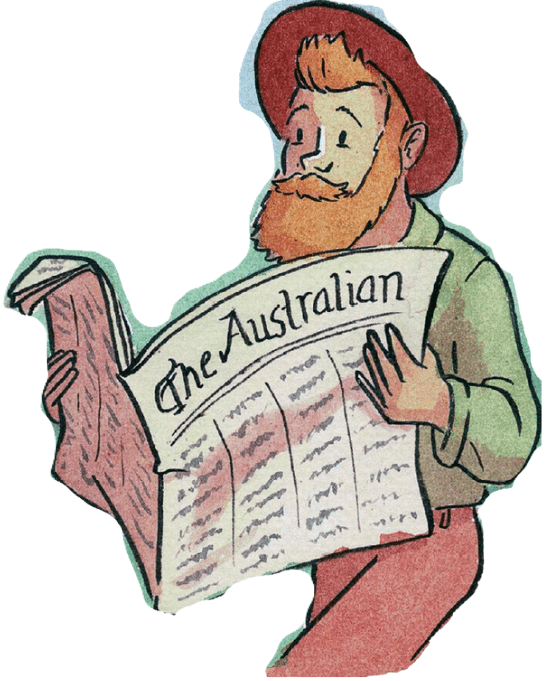
William Wentworth and the Australian

Private Sudds and Thompson

Case Method Discussion Questions
Page. 8-10
- What was the management of the New South Wales’ British colony like before Governor Darling arrived? Do you think it was being managed effectively?
- Do you think bringing in Ralph Darling as the governor will be a wise decision on the part of the British government? Why or why not?
- What were the main issues faced by Governor Darling when he arrived at the New South Wales’ colony? What are some possible solutions to these challenges?
Page. 12-14
- What steps did the British government take to restore New South Wales to a proper penal colony? Do you agree with these measures? Why or why not?
- What is distinctive about Governor Darling in terms of his leadership style and personal qualities? Do you think these qualities will make him an effective governor? Why or why not
- What does it mean for the Governor’s word to have the effect of law? What issues might arise from this? How might checks and balances mitigate any potential issues?
- What changes could be implemented to enhance the fairness of the legal system?
Page. 15-16
- What resulted from the 1823 NSW Act? Which specific institutions did it establish? Why did these changes need to occur?
- What is meant by ‘separation of powers’ and how does it stop an excessive concentration of power?
- Why are checks and balances beneficial mechanisms to limiting the Governor’s power? Why does the Governor’s power need to be ‘checked’ or limited?
Page. 17-18
- What is distinctive about Chief Justice Francis Forbes? Do you think his view on the law will be the same or different to that of Governor Darling? How so?
- What is Forbes’ role as Chief Justice of the Supreme Court? Do you think this role is in tension with the role of Governor Darling?
Page. 19-23
- If only positive comments on Governor Darling’s administration are allowed in the press, what could be some consequences?
- How does a free press serve as a check on governmental/Darling’s power? Do you think it is beneficial to have a free press?
- Why is it beneficial for there to be freedom of press and for newspapers (like ‘The Australian’) to be able to write openly about government actions (even if negatively)?
- Was it full freedom of press? Were there any limitations on the press’ freedom (from Darling or others)?
Page. 22-24
- Is an annual license that requires each newspaper to apply to the Governor to be published fair? Would you support such a law? Why or why not?
- Do you think this restriction on the freedom of press is justified in a colony of convicts? Why or why not?
Page. 25-28
- What does the case of Joseph Sudds and Patrick Thompson (and their desire to become convicts) reveal about the perception of convict transportation back in England? Has Darling been effective at setting up the colony as a place of statutory terror?
- Was Governor Darling’s treatment of Sudds and Thompson reasonable? If no, what would you do differently?
- Do you agree with how Australian newspapers portrayed Governor Darling during this incident? Do you think it is good for the press to hold the Governor accountable?
Page. 29-34
- Do you support Governor Darling’s attempts to control what newspapers can write? Why or why not? Is this a restriction on the freedom of the press?
- How do you think Chief Justice Francis Forbes should react to the bills that Governor Darling proposed?
- Do you think the freedom of the press is important? Why or why not?
- Should the freedom of the press be restricted? Why or why not? What decision do you think the British government should make?
- Is the colony really in danger, or are other reasons motivating Darling to submit the Bills?
- Should Governor Darling break the law, or make laws that are ‘repugnant’ to other laws if he is worried about the safety of the colony? Why is it important that he, as the Governor, follows the law?
- If Governor Darling breaks the law, who should hold him to account? What characteristics are needed so that there is justice?
- Could there be justice if Governor Darling could direct Chief Justice Francis Forbes on how to make his decisions?
- Who do you think is right – Governor Darling or Francis Forbes? Do you think the Bill should pass?
Page. 35-37
- Did Francis Forbes correctly execute his duty as Chief Justice of the Supreme Court? Was Governor Darling a lawful governor? Why or why not?
- In Francis Forbes’ letters he saw his role as ‘bowing to no power. ’ Why did he see this as important? What authority did Francis Forbes believe he had to follow?
- Who was the most powerful person in the colony? Who had the least power?
- Why can there be conflict where two bodies such as the judiciary and government are independent of each other? What or who is this conflict ultimately protecting?
- As Governor Darling was held to account for (trying) to overreach his powers, how would that impact him and other later Governor’s in exercising their duties? Who would this protect?
- If Governor Darling had been successful in passing his Bill for a newspaper licence, what would that mean for newspapers who report about other times the Governor oversteps his powers
- What does this case tell us about the importance of having a separation of powers in modern-day Australia?
- Are checks and balances, an independent judiciary and freedom of the press important? If so, why? What are the benefits and potential shortcomings of this system?
- How do checks and balances on those in power help to protect our individual rights and freedoms in Australia?

The Outcome
- A year later, the Crown Law Officers in London examine the case and affirm that Forbes correctly executed his duty by refusing to certify the bill to regulate newspapers.
- Even despite pressures from Governor Darling to the contrary, Forbes had stood firm to protect the rights of those in the colony.
- Forbes’ ability to remain judicially independent and impartial, even amidst pressures from Governor Darling, laid the foundation for the separation of powers in Australia.
- This enduring legacy underscores the necessity of checks and balances (including an independent judiciary and free press) in Australian governance, which remains relevant today.
Other Resources on Australian Legal History
Click here to read about the first civil case in NSW


